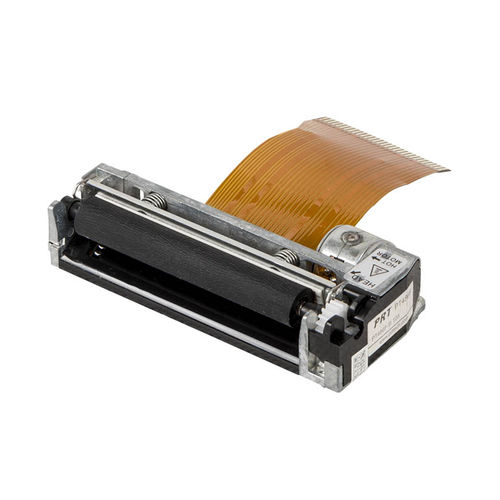
- Industrial machines and equipment
- Printing, Marking and Engraving
- Direct thermal printer
- Xiamen PRT Technology Co., Ltd.
- Products
- Catalogs
- News & Trends
- Exhibitions
Direct thermal printer PT486desktopcompactindustrial





Add to favorites
Compare this product
Characteristics
- Technology
- direct thermal
- Configuration
- desktop
- Other characteristics
- compact, industrial
- Resolution
203 dpi
Description
Overview
1. Low voltage supply
The voltage used to drive the thermal printer head is equal to the logic voltage, or is driven by a 5 V single power line, the range of operating voltage is 4.2V-8.5V, so four to six NI-Cd batteries or Ni-MH batteries can also be used. Two li-ion batteries can be used.
2. Compact and lightweight design
The mechanism is compact and light, dimensions: 69.7mm (width) * 32.7mm (depth) * 15.5mm (height)
3. Printing with high resolution
A high-density printer head of 8 dots/mm makes the good printing quality
4. High speed printing
According to driving power and sensitivity of thermal paper, set different printing speed required. Printing speed is 70 mm/ s(max.)
5. Easy paper loading
Detachable rubber roller structure makess the paper loading easier
6. Low noise
Thermal line dot printing is used to guarantee low noise printing.
Specification
Series Model PT486
PRINTING CHARACTERISTICS
Print Method Direct line thermal
Resolution 8 dots/mm
Max. Printing Width 48mm
Number of Dots 384
Paper Width 57.5±0.5mm
Max. Printing Speed 70mm/s
Paper Path Curved
DETECTION
Head Temperature By thermistor
Paper Out By photo sensor
Platen Open Optional
POWER SUPPLY
TPH Logic Voltage 2.7V-5.5V
Drive Voltage 4.2V - 9.5V
PEAK CURRENT
Head(Max.) 2.4A(7.2V/64dots)
Motor Max.1.0A
RELIABILITY
Pulse Activation 100 million
Abrasion Resistance 50KM
ENVIRONMENTAL
Operating Temperature 0 - 50℃
PHYSICAL CHARACTERISTICS
Dimensions(W*D*H) 69.7*32.7*15.5mm
Mass 45g
VIDEO
Other Xiamen PRT Technology Co., Ltd. products
Thermal Printer Mechanisms
*Prices are pre-tax. They exclude delivery charges and customs duties and do not include additional charges for installation or activation options. Prices are indicative only and may vary by country, with changes to the cost of raw materials and exchange rates.





















